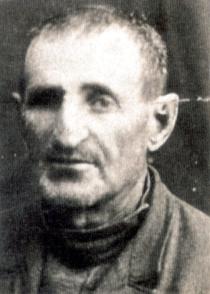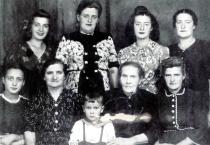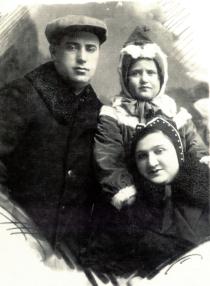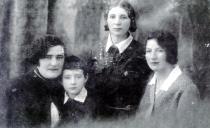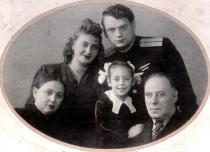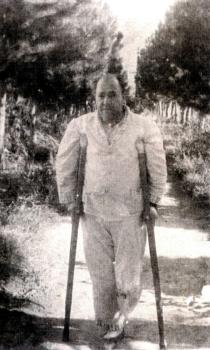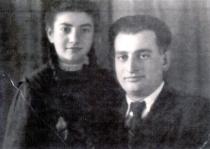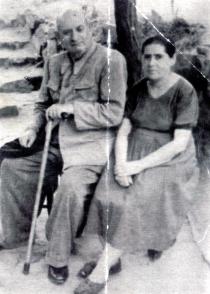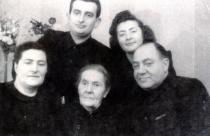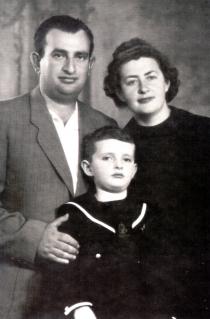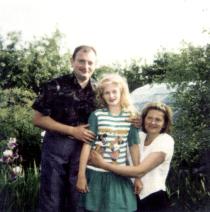
Semyon Gun
Odessa
Ukraine
Interviewer: Nathalie Rezanova
Date of interview: August 2003
Semyon is 70 years old, but he looks young for his age. He has a tanned vivid smiling face. He has silver-gray crew-cut hair and wears glasses with a fashionable frame. He has a busy schedule and we met in his office in the GUN-LUXE Fashion Shop in Novoselskogo Street in the center of Odessa. Its big windows on the first floor of a building face the street. There are drawing curves and sample products and fabrics on the walls of director's office. Semyon Gun is in his work clothes when he is in the shop: wears cotton shirt and linen trousers. There were dressmakers coming to his office with their issues, telephone calls, but Semyon told his story without any hurry, and enjoyed the conversation. We had green tea with honey, pears and apples from his garden. He was very pleased to have this opportunity to recall his past.
My family background
Growing up
During the war
Our return to Odessa
Perestroika
Glossary
My great grandfather Shulim Hudson was born in the town of Borshchagovka near Kiev. [In Borshchagovka town, Skvira district, Kiev province, according to the poll of 1897 the population was 3196, 1853 of them were Jews.] I don't know the dates of his birth or death. My great grandfather was a tailor, I think. We inherited this profession through generations. The last name of Hudson turned into Gun in 1919, during the census. According to the family legend my grandmother said to my grandfather 'What kind of a last name is Hudson! Let's make it Gun - it'll be better this way'. I have no information about my great grandmother.
My paternal grandfather Shlyoma Gun was born in Borshchagovka in 1874. We spent our summer in Borshchagovka in 1938-1940. I was 4, 5 and 6 years old, accordingly, and only have dim memories about those years. I remember grandfather Shlyoma with his tapeline around his neck, wearing a waist- shirt and a kind of a tie and trousers with suspenders. He always wore a yarmulka. He had a beard. He smoked a pipe, even when he was working. I remember well how my grandfather came onto the threshold of his house with a huge antediluvian iron with charcoal. He brandished with it and sparkles were flying from the iron. I liked it very much. I liked watching him ironing through a wet cloth that generated steam. He put the iron on a brick on his desk. I remember that my grandfather was cheerful: he used to tease me, often smiled and joked. Grandfather and his family lived in a rather primitive stone house. The roof was covered with a thick layer of brushwood and straw. There was a big stack on the roof. There was a well in the yard, a shed where they kept a cow and a horse and a vegetable garden near the house. Since we always rode from his home to the train station on a horse-driven cart, I believe this horse and a cart belonged to my grandfather. I am not sure how many rooms there were in the house. There was my grandfather's shop and the next room had a stove. In the evening there was a kerosene lamp burning in it. There were chairs and long benches by the wall in this room. The family had dinner at a big table in the room. The house was by the side of a road in the outskirts of the town. There was a forest nearby. There was also a river near the house. When my father's brothers came to Borshchagovka in summer we went swimming and rowing. Grandfather stayed at home. He spoke Yiddish to grandmother and with us they spoke Russian using Jewish and Ukrainian words. I don't know whether my grandparents had any education. I don't know whether they went to synagogue, either. I don't know whether there was a synagogue in Borshchagovka. However, I am sure that my grandfather was a religious man since my father was raised religious.
My paternal grandmother Brucha was born in 1879. I don't know her maiden name or place of birth. I remember that she was a short fatty woman. She wore dull-colored clothing. I remember her gray-and-black skirts. She always wore a gray or flowered kerchief. I was a poor eater in my childhood and my grandmother made me eat cereals or carrot pancakes. For this reason she seemed strict to me while my grandfather always took my side. I think my grandmother was as religious as my grandfather Shlyoma. Grandfather Shlyoma, grandmother Brucha, their daughter Sonia, her husband and their child were killed by Germans in Borshchagovka during the Great Patriotic War 1 in 1941. After the war my father's brother Isaac went to Borshchagovka. He talked with people. Eyewitnesses told him that German troops occupied the village in September. They shot all Jewish population and hanged those who resisted. They were buried there, but there are no graves. I don't know or what reason our family didn't go to Borshchagovka in summer 1941, but this rescued us. Shlyoma and Brucha had five sons and a daughter. There were all born in Borshchagovka.
My father's older sister Sonia was born in 1902. My parents told me that she married a Jewish man at a rather mature age. Her husband's name was Benia. They had a daughter. Her name was Riva. I remember that my aunt Sonia had beautiful black hair. I don't think she had a character of an angel. She interfered into her younger brothers' life. I remember that my mother sighed 'Oy, Sonia!' talking about her in far from flattering words. Sonia and her family were shot by Germans in Borshchagovka.
I don't remember my father's brother Iosif, but I know that he was born in 1906. All I know is that he lived in Kiev before the Great Patriotic War. From there he went to the front where he perished in 1941. His wife's name was Bronia and their daughter's name was Rimma. I remember Rimma well. They visited us after the war. Bronia was a short fat woman. She was as quick as flame. I think she worked in commerce. Bronia and Rimma lived near Gorky Street in Kiev. Bronia and Rimma with her family moved to USA in the 1970s. They live somewhere in California.
My father's brother Misha was born in 1907. He had tuberculosis since he was a child. I don't know how Misha moved to Odessa from Borshchagovka. He married Raya, a Jewish woman. They lived in Sredniaya Street in Moldavanka [in a poor Jewish neighborhood in the outskirts of Odessa]. They liked guests. I liked to visit them. Raya always gave me a toy or candy. They always invited us on holidays, but I can't tell whether they were Jewish or Soviet holidays. They had matzah and their daughter Riva cooked delicious food from matzah. She must have learnt it from her mother. I never heard Yiddish spoken in Misha's family. Misha received an invalid's pension and earned some money by sewing. Raya was a vendor in Moldavanka. She sold pies, jam, wine and soda water. They were wealthier than we. Raya and Misha had two children: Lyova, born in 1931 and Riva, born in 1935. During the war their family evacuated to Tashkent [3,250 km from Odessa, in Uzbekistan]. Raya and her daughter visited us in Siberia where we evacuated during the war. I remember they brought dried apricots and fruit. It was a rare delicacy. They wanted us to come to Tashkent and were thinking of staying there after the war. Misha probably liked the climate and Raya never had any problems with finding a job with her commercial talents. Anyway, they returned into their prewar apartment in Odessa after the war. They had two small rooms with no comforts. Misha died of tuberculosis in 1947, at the age of 40. He was buried at the Second International cemetery in Odessa. His wife Raya died in the middle 1950s. Lyova was a troubleshooter: he was single, didn't work and was in conflict with the law. He died in the middle 1970s. After her mother died Riva tried to take to commerce, but failed. She married Grisha Goriachkovski, a Jew. In 1992 they moved to USA with their two sons. They live in Brooklyn.
My father's brother Isaac was born in 1913. Before the Great Patriotic War he lived in Kiev. During the war he was a tank man at the front. He even took part in the war with Japan 2. He was slightly wounded several times. After demobilization Isaac married a Jewish woman in Kiev. His wife Manya was an accountant. They lived with Manya's older sister Fania and her husband in an apartment in Konstantinovskaya Street in Podol. Isaac and Manya had two children: daughter Bella and son Marik. Bella married Arkadi, a Russian man. They divorced shortly after they got married. Marik married Luda, I think she was Jewish. I cannot say anything about Isaac's religiosity. I didn't ever hear them speaking Yiddish. Isaac, his wife and daughter moved to Israel in 1987. His son Marik and wife Luda moved to USA some time ago. Manya died in Israel. Bella lives there with her father. Isaac had two surgeries: he had cancer tumor removed. He feels better now.
My father's brother Efim was born in 1915. He finished Kiev Medical College before the war. He married Manya, a Jewish girl from Zaporozhe and moved there. They had a son named Grisha. Efim served as a military doctor in a military unit. He received a uniform that he didn't quite like. He asked for some fabric and made a uniform. Everybody was surprised: an officer could sew! He could sew like my father's other brothers. When the Great Patriotic War began Efim went to the front and his wife and Grisha evacuated. I don't remember where they were in evacuation. In 1941 Efim's family received a notification that he was missing in action. After the war Grisha and Manya returned to Zaporozhe. Grisha finished a Medical College and got a job assignment to Murmansk where he was chief doctor of the town hospital. Grisha continued a search of his father after the war. He wrote requests to whatever agencies until he bumped into the lists of Soviet prisoners-of-war who had perished shortly before the end of the war in Buchenwald or Auschwitz where he saw his father's name. I've lost contact with Grisha recently. His mother Manya lived with him and I don't remember when she died.
My father Anatoli was born in 1910. He was probably given a different name at birth, but Anatoli is his name written in his passport. Why I think so is because my grandfather Lazar sometimes called my father Tuly at home. [Editor's note: probably Semyon's father's name was Naftula, a Jewish name.] My father went to school in Borshchagovka. He rarely recalled his childhood. He always remembered that he was forced to study a profession of tailor. Most likely, grandfather Shlyoma taught his sons himself. My father never told me how he happened to move to Odessa in the early 1930s. All I know is that he came to the house of his parents' acquaintances Lazar and Risia Alpert. Their adoptive daughter Fira lived with them. She was my future mother..
All I know about my mother's father is that his name was Semyon Shtilman. Lazar and Risia Alpert adopted my mother and her sister, but they didn't process any official documentation and the children kept their father's last name. [Editor's note: Semyon called his mother's adoptive parents 'grandmother' and 'grandfather'.] My maternal grandfather Lazar Alpert was born in 1880. Most likely he also came from Borshchagovka. I don't know who his parents were. Lazar said he was a blacksmith from the age of 12. My grandfather was physically very strong. He told me that he could hold an old model gun by the tip of a bayonet with his fingers and his arm stretched. Lazar served in the tsarist army. Nikolay the Second 3 came to the regiment where my grandfather was serving. When he was inspecting the alignment he saw that my grandfather's collar was unbuttoned. Nikolay pointed this out to commanding officer of the regiment. The commanding officer replied that the largest size shirt was too tight for my grandfather and Nikolay ordered that they made an individual uniform to my grandfather. Lazar told me, the soldiers had two meals in the tsarist army: breakfast and lunch, no dinner, but this was plenty of food. Four military got a big casserole of borsch - one liter and a half per person and a bowl of cereal. During WWI my grandfather Lazar was captured by Austrians. He remembered that at first prisoners were taken to the sauna. They received soap and when they applied it on their skin the Austrians turned down the water for few minutes. Grandfather said that the soap was biting sharp into their skin. This was a kind of disinfection that they had. Austrians were loyal to them. There was no suppression. Grandfather Lazar also told me about Jewish pogroms during the Civil War 4. I remember one of his stories when an equestrian gang 5 rode into their village and began to torture Jewish families. My grandfather wanted to escape on a horse-driven wagon. One bandit began to follow him. They fought and then the bandit began to shout for help. My grandfather managed to hide in rush on the bank. He stayed underwater for hours breathing through a rush tube. In the evening he got from under the water and ran to somebody's house where he hid under a bed. In Odessa my grandfather worked in a forge near a military unit in Politseiskaya Street. He didn't earn much there. I remember he had a coat that he always wore before the war. Grandfather Lazar went to synagogue on holidays. He had a prayer book: a small thick book that he read through a magnifying glass. He also had a printed Torah. Lazar spoke Russian to me and Yiddish with his wife Risia and my parents. He had a moustache that he liked to wave. I don't know whether he observed kashrut. I know that grandfather Lazar never ate garlic or onions and had gefilte fish and cutlets cooked separately for him.
My maternal grandmother Risia Alpert was born in 1870. I have no information about her parents, her place of birth or her youth. Risia was about 10 years older than my grandfather and had no children of her own. Risia was a religious woman. She went to synagogue with her husband on holidays. She wore dull colored clothes: gray skirts and gray blouses. I remember a dress that she had: dark brown with white dots. Risia wore jackets that she knitted herself. I remember her knitting needles. Grandmother wore a kerchief at home and outside. She spoke Yiddish with grandfather Lazar and my parents. Risia always looked good: she took care of herself. She was healthy and her skin was soft and smooth. My parents used to say 'Oof, she likes herself!' Every morning grandmother Risia had tea with lemon and bread and butter. She didn't drink alcohol at parties: she poured some vodka into a saucer and dipped bread in it. She also had another peculiar feature: she swallowed pills and other medications without washing them down. She had a strong throat and could drink boiling water. Risia had no education, but she counted in her mind in a jiffy. Grandmother Risia liked me dearly. If my parents put pressure on me I complained to her. She always gave me some money on holidays. I addressed her with informal 'you' while I always addressed my grandfather with formal 'you'.
My mother's older sister Nina was born in 1910. She didn't remember the place of birth or her parents' place of birth. I remember that she could read, so I think she might have finished a primary school. I heard one story about her youth incidentally. Once when I was young - it was in 1957 - I hailed a car returning home late at night. I sat in the car and said 'To the circus'. And the driver said 'Oh, my sweetheart once lived there'. He started talking and told me that his sweetheart's name was Nina. She had blue eyes and fair hair. She refused him. I asked him in what number she lived and he said the number of our house. My mother told me later that Nina was a very beautiful girl. She was very selective and refused many men. She remained a spinster in the end. Nina lived with us before the Great Patriotic War. She loved me and my brother. She evacuated with us and was quite a member of our family. I remember that after the war doctors used to come to attend to her often and there were ambulances, too. She managed to get a room in an apartment due to her poor health condition. She died in 1964 when I was at a training course in Moscow. She was buried at the Jewish cemetery.
My mother's younger brother Yakov Shtilman was born around 1915. He was a little younger than my mother. I don't have any information about his childhood. I don't know where he was raised. He was a political officer in the army during the war. He finished the war in the rank of captain or major. I don't know what he did after the war. He lived with his wife Uliana in a district town in Cherkassy region. His wife was a beautiful Russian woman. Her neighbors tortured her about marrying a Jewish man so hard that she hanged herself in the 1950s when Yakov was on service. Their son Lyonia was a baby when this happened. Yakov visited us after this tragedy. I remember him wearing his military uniform with a belt, waist case and a map case. He was very reserved. Yakov raised Lyonia himself. Yakov died a sudden death in the 1960s. My parents went to his funeral. After he died my cousin Lyonia stayed with us when taking exams to the Navy School, but he failed. I visited him in Cherkassy in 1974. He had a Russian wife. Her name was Luba. They worked at a plant. She was a nice woman. They had two children. He stopped calling me for some reason. They moved to another place, he divorced his wife and disappeared from my field of vision.
My mother Fira Shtilman was born in 1912. My mother either didn't remember or didn't want to tell me where she was born or who her parents were or why she became an orphan. We didn't have any information about her childhood. The Alperts adopted her and her sister, but nobody told me how it happened. I am sure that my mother wasn't in an orphanage or we would know about it. My mother studied at school. She could read and write in Russian. My mother was a quiet and reserved woman: Shtilman means 'quiet person' in German and it fully corresponded to her personality. In the 1920s my mother was an ardent Komsomol activist, as she told me. In the 1930s my mother worked in joiner's shops in Odessa.
My father and mother got married in 1933. They had a civil ceremony. They rented a room in the house where the Alperts lived. In some time my parents received an apartment in a wing house in the yard of this house and moved into their former apartment. I was born in maternity hospital #2 in Komsomolskaya Street in Odessa on 17 October 1934. I was named Semyon after my mother's father. I was circumcised on the 8th day. On 21 December 1937- Stalin's birthday - my brother Alexandr was born. I attended a kindergarten then from where I brought measles, chickenpox and whooping cough and Alexandr contracted them. I actually didn't fall ill while Alexandr had all these diseases. We lived in 27, Podbelskogo Street, near the circus. There was a typical town yard near our house; a well-shaped yard. There was a pump in the center of the yard and a toilet on the right. Neighbors used to sit on benches eating sunflower seeds. Everyone knew everything about all neighbors and everybody took an active part in the upbringing of their neighbors' children. I remember Ustina Valchuk, a huge woman. She liked to watch swallows under the roof of our house from her hallway. Ustina often called me to say 'See how they make a nest' or 'see how they teach their little ones to fly'.
My father worked as a storekeeper at the tinned food plant named after Lenin near Chumka 6 before the war. My father was a communist. His friend Yasha Shraidman was something like a commercial director at this plant. My mother and her sister Nina worked in joiners' shops in Bugaevka in the outskirts of the town. I don't know what my mother did in particular, but she was well respected at her work and had awards for her performance. Her sister and she always came to work on time and never missed a day of work. Once there was one-meter deep snow in Odessa, but they still came to work, although public transportation did not commute. There was even an article published in a newspaper on this occasion.
We often had guests. My father was a hospitable man. He could give away anything. I remember even conflicts on this subject when my mother wanted to save some food, but my father was dead against it: guests in the house - everything should be on the table. My parents didn't have any luxuries. My father had a gray checkered suit and Ukrainian embroidered shirt before the war. My mother wore white collars on her blouses - they looked fancy. It's strange, but I can't remember a single dress that she had. My mother's hair turned gray before she reached the age of 30, but she didn't color her hair anyway. Since my father was a member of the Communist Party we didn't observe any Jewish tradition at home and didn't go to the synagogue at all.
I was raised in such a way that I received a gift from 'Mr. Stalin' on every Soviet holiday: my parents put it in the wardrobe. I remember drawing profiles of Lenin 6 and Stalin together and then Karl Marx 7 and Friedrich Engels 8 -there were four profiles in a row and they were not bad at all. I also painted tanks with flags and inscription 'For Lenin, for Stalin'. I was raised on these slogans. In 1941 I turned 7 and was to go to two schools: secondary school and a music school in Sobornaya Square. My parents wanted me to play the violin.
On 22 June 1941 My father and I went to visit our neighbor paralyzed after he was wounded at the Finnish War 9 in the Kuyalnik recreation center 10. We were in his ward when at 3 pm a nurse ran in yelling 'there's a war, there's a war!' All visitors left at once and so did we. Trams were overcrowded. People were running. They carried bags of soap, bread, sugar and cereals from stores. When first air raids began in Odessa Alexandr used to say 'Senia, what are you afraid of: they are our armies shooting' and he lisped his words a little. When my father's plant was ready for evacuation my father was included in the equipment escort group to transport equipment by sea transport. Our family didn't obtain any permits to this ship. My father drove a truck loaded with empty boxes to our house and we hid between them: my mother and I, Alexandr. Aunt Nina, Risia and Lazar and we successfully drove to the harbor. There were people on the shore, but they were not allowed to board the ship. Then German planes began to bomb the harbor. People scattered around and we hid under a tent. There were suitcases and bags all over the harbor. When the planes flew away my father went to talk with the captain of the ship and we were allowed aboard. We arrived at Novorossiysk. The ship was overcrowded. I remember big and sweet pears that we had in this town. The equipment was loaded on a train to be transported to Siberia. We went by this train as well. We had few boxes of apples and pears with us. We arrived at Tobolsk [2,900 km from Odessa], Tumen region, where local residents saw these fruit for the first time. We gave them apples and they didn't know how to eat them.
As soon as my father delivered the shipment to the point of destination he was summoned to the front. He was a private in infantry. There were horrific casualties and then it was easy to get a promotion particularly when a person was a communist. My father was made commander of a squad and then a master sergeant. He was responsible for making all necessary provisions to his unit. My father told me that they once, when they were taking weapons to the front line a splinter broke the truck lights and they almost got lost. It was a miracle they were not captured by Germans. He also told me about the New Year near Stalingrad. The distance between the front lines was about 25 meters. Our soldiers could hear Germans playing mouth organs and having fun. Then Soviet and German soldiers started talking and throwing cigarettes and treatments to one another. It was a surprise for me. But my father said people were only human. Who ever wanted to kill each other? The night before Stalingrad battle my father wrote a letter home. My mother read it to us aloud: 'I am writing this letter in the moonlight. It's 3 am and in the morning we shall go in attack...' We received his next letter in three months from Voronezh where my father was in hospital. He told us that a shell exploded near him and all others around him were killed. He fainted and when he regained consciousness he thought he had lost his leg so acute the pain was. In hospital doctors removed few splinters, but one. The doctor said that might injure hamstring if they wanted to remove it and then my father's leg wouldn't bend. My father agreed to leave it there. This splinter caused a lot of pain for the rest of his life. Every now and then his leg got swollen and turned blue and in bad weather it ached.
We lived in Tobolsk for two years without my father. My mother and grandmother Risia didn't work. We had a vegetable garden and received food packages. Grandfather Lazar earned some money by sewing. Aunt Nina worked hard at the timber cutting facility where she caught cold that had an impact on her health for the rest of her life. We lived in the street along the river bank. There were wooden houses in the street. There was a Russian stove in each house. There were round openings in the walls 10 cm in diameter that served for the purpose of ventilation. They were tucked with rags. Every week families went to the sauna. The major part of the life of local residents was sauna, tea and pies. During the war there was no sugar or tea and they drank boiling water with salt and garlic. Pies were made with fish filling. It took us some time to get used to this food. They grew carrots, turnip and cabbage - very delicious. We also made nettle soup and 'zatirukha': water added to flour cooked on the frying pan. In winter frozen milk wrapped in cloth was sold. Milk boiled in a Russian stove was something out of this world. We received lumps of chocolate instead of sugar. It was more delicious than chocolate that we have nowadays. We looked forward to receiving a letter from father. When a postman brought a letter he was always invited for a cup of tea. Mother read these letters with tears in her eyes.
There were two stone buildings in Tobolsk: a church and a school building of red bricks on a hill. I went to school there. I didn't have a pen and grandfather Lazar cut a stick from a branch and made me a pen. This was the first pen in my life.
In 1944 my father was demobilized from the army due to the wound he had had. He came to pick us up and we moved to Tumen where Yasha Shraidman was working. He was my father's friend from Odessa. Yasha helped my father to get a job at the storage base where assistance from America was delivered. They received food, clothing and uniforms. We were well provided then. We often had guests. My father enjoyed such gatherings. He knew many humorous stories and jokes. Aunt Nina worked at the fish smoking factory in Tumen. Alexandr went to school in Tumen in 1944. He fell ill with meningitis. By some miracle our parents got sulfidine that cured him. There were about 25 other patients with meningitis in his ward. He was the only survivor. When my mother heard on the radio on 10 April 1944 that Odessa was liberated (10 April was my mother's birthday), this was the greatest gift in her life. Since then she only looked forward to one thing: returning to Odessa.
In autumn 1944 we began preparations for returning to Odessa. My father and Yasha Shraidman rented a railcar, installed a stove with a stack in the middle of it and made two-tiered plank beds. We had huge food stocks to go: big containers with American tomato sauce that we spread on a slice of bread, containers with sunflower oil, jars of pork meat, cookies, American brown sugar and alcohol. We also took jeans and parka jackets that my father had in store. We also took repp fabric: when we arrived in Odessa we had jackets made from it in a garment shop. In 1944 before an anniversary of the Great October Socialist Revolution 11 we arrived at a sorting spur in about 10 km from the center of Moscow. My father packed few jars of pork meat and a couple of bottles of alcohol into a bag and went to manager of the station. 'Somebody asked me to deliver a parcel to you. - Who? - I don't know. They just asked me to give it to you. - What am I expected to do? - Just have our railcar driven to a spur closer to the city'. After this discussion our railcar was placed so that we could watch the fireworks from our window.
I remember our arrival in Odessa. The railway station was ruined and there was debris scattered all around. We hired a wagon and two horses, loaded the wagon and walked after it along Lenin Street across the town. My parents kept looking around and kept asking each other whether the Opera Theater was still there. When they saw the theater they felt very glad. When we came to our gate janitor Khristia didn't want to let us in. She didn't want Jews to live in this house. We had to argue with her until she let us in. Our neighbor Motia Fukovskaya, a Russian woman, let us stay in her room since she was staying with some acquaintance of hers. Motia kept few pieces of our furniture and even our family photographs. She had her photographs on top of ours hanging on the walls in her room. Our rooms were occupied by tenants from the wing house. They didn't want to move out. We had to turn to court to have our rooms back. We had two 18 square meter rooms. There were two windows with curtains in one room. There was a stencil in one room: dark blue posts on the white background. There was my mother's bed with nickel-plated cones, a carpet on the wall and my mother and father's portraits above. There was a bookstand with magazines and book Delicious and Healthy Food, few Sholem Alechem 12 books translated into Russian and my textbooks. There was also a desk where we did our homework. In the darker room there was a sofa where I slept and my brother's bed, and later there was also my sister Bella's bed. We had a common kitchen of about 8 square meters in size. There were two tables in it: one was Motia's and one - ours. There was a sink in the corner and a coal stoked stove. There was also a stove in the room. My mother began to clean up the rooms. Once she felt ill when she was hanging a photograph on the wall standing on a chair. My brother and I were taken out of the room. A doctor from a neighboring house came to attend to our mother. Our mother started labor. There, on 5 January 1945 my sister Bella was born.
We also turned to court to get back grandfather Lazar and grandmother Risia's apartment, but failed. They received two smaller rooms instead. I remember a big dark green iron wrought box with a lock and a nickel-plated bed that they had. They were poor after the war, but they supported us nevertheless: we often had lunch at their place and my grandfather used to buy me an undershirt or socks every now and then. After the war grandmother Risia sold dresses at the market on the corner of Sadovaya and Torgovaya Streets. Lazar worked as a blacksmith in the same forge. There were three German prisoners-of-war working there. They were brought there from a prison to work. My grandfather said they had a very hard life: they ate cats and dogs. Lazar brought them some food there. Grandfather treated them well. He said Germans could be different, too. The ones who worked with him were hardworking and accurate. There was ideal order in the forge and in the woodshed. I often came to my grandfather's forge. One of these Germans gave me a small silver-rimmed comb, a thimble and an ivory seam tool to remove tacking thread. This German seemed to make a right guess about my future profession. I kept the thimble for a long time. I learned to like good tools: childhood impressions are long remembered.
Grandfather Lazar also earned some money shoeing horses in the circus. He often took me with him: I handed tools to him. Once grandfather Lazar even shoed an elephant. The elephant didn't like something and he picked my grandfather and lifted him. Then Boris Eder, an animal trainer, an Honored Artist, rushed to my grandfather's rescue. Many actors came to Odessa on tours, but they sometimes had to perform with about 15 spectators in the hall. People were afraid of going out: there were many robbers around.
I had many friends in the house and at school. Our friends in the house were twins Yuri and Vadik Rachniaks. Their father was an engineer and worked at the Far North. The boys went there to visit him and told us how cold it was there. I went to the 4th from in Odessa and Vadik went to the 2nd form at school #50. I don't remember any anti-Semitism at school. There was a healthy environment from this point of view. Somebody told me some time that there were abuses in the streets. I never faced any. Alexandr and I studied well at school. I was an active Komsomol member at school. My closest friend Igor Milan was Russian. We became friends in the 7th form. He played the guitar and sang. We got together at his home in Paster Street: we sang, drew and issued a wall newspaper. His father was in the Navy. He perished on the first days of the war. His grandfather was in a partisan unit in Odessa. Igor Milan, Oleg Novitski, Syoma Sorokatiazh, Valentin Goldenberg and I were leaders at school. Actually, our class was unique: 8 or 9 of my classmates finished school with medals. I took part in amateur art activities. We played football and basketball at school. I took sandwiches with goose cracklings to school. It was such delicacy!
I still keep in touch with my school friends. Recently, in the late 1990s, our teacher of the Ukrainian language Natalia Iosifovna died. She was a strict teacher, but children liked her for being just. Her former pupils collected money for a gravestone. This year is 50th anniversary of finishing school and I hope we shall get together on this occasion. My best school friend Igor Milan has passed away.
Life wasn't too bad after the war. We had food stocks. There were no cigarettes and my father made some from newspaper. He made wooden guns for Alexandr and me to play. As for anti-Semitism, my father said that before the war there was a law against national abuse while after the war things went out of control.
My father wore an army jacket. He liked clothes with neck-high buckles, the so-called 'Stalin's collar'. He walked with crutches. He used to attend parents' meetings at school and our class tutor asked him to chair such meetings. My father had to find a job. He didn't have any special education, but he had excellent organizational skills. His friends helped him to get the position of director of a bakery on the 4th station of the Fountain. In late 1945 an audit identified violations. My father was expelled from the Party and sentenced to 10 years in prison. My mother was there alone to raise three children. At that time my father's brother Isaac demobilized from the war with Japan. He stayed with us and supported our family for few months. Aunt Nina and he made cotton wool jackets at home. Nina worked in a garment shop and was very quick at work. She showed me how she made pants within 40 minutes. My mother sold cotton wool coats at the Novy market. I remember my mother giving me 30 rubles - a reddish banknote - and we went to the Novy market to buy 200-300 grams of delicious plum jam that we spread on bread. There were plenty of apricots: the best were 20 kopeck per kilo. There were lots of apricot stones around at the market. We picked them up to dry the seeds: they were delicious. We were hard up at the time when our father was not with us. However, the house was perfectly clean; mother did a clean up every day and on Friday there was a general clean up before day off. But we didn't observe Sabbath. Our mother taught us to keep everything in order and check all windows, taps before leaving home.
A loaf of bread cost 1000 rubles. My mother became an apprentice at a hairdresser's. She became a hairdresser. She also kept addressing lawyers appealing for the father. She also needed money for this. She wrote requests to all kinds of institutions until our father was released.
Our father stayed in prison for about two years. When he returned he was offered to restore his membership in the Party, but he refused. My father was a good tailor and at the beginning he made military uniforms at home. I remember that he made a uniform for the son of our janitor Khristia Pavel who finished the war in the rank of lieutenant colonel. After the war Pavel finished the Military Academy in Moscow, became general colonel and commanding officer of the Caucasian regiment. When my father returned home from prison this future general came home on vacation and my father brought him a jacket and an overcoat. It turned out so well that Pavel was more than pleased. I remember how afraid my mother was of financial inspectors with their portfolios. Some people wrote anonymous letters reporting on my father that he had private business. Financial inspectors fined my father..
In 1947 my father became a tailor in the Navy School. He was responsible for fixing uniforms for cadets. My father also made uniforms for the management of the school. Cadets usually asked my father to make their trousers narrower or wider depending on fashion trends. My father had a lot of work to do and was well respected at work. Cadets liked him. He was a good mixer. My father also continued sewing at home for some time. He had dinner after he came from work and then went to sleep for 2-3 hours. Then my mother woke him up and sat down to his desk to work until about 4 am. He worked in the same room where I slept and the light and Singer sewing machine often woke me up. After the war people wanted to have their clothes made with consideration of future mending. My father had an acquaintance: an elderly Jew who was an expert in the darning of an upper pocket on a jacket. When an old jacket was altered and turned inside out its left lapel switches to the right side and the pocket is to be on the left. All Odessites knew that this old tailor could make such darning on the spot where the pocket used to be that nobody could tell there used to be anything. My father talked about him with admiration: 'Yeah, he is a specialist!' My father made tussore, canvas and woolen suits at home. He took the welting to be starched, then sewed over horse's hair, applied cotton wool to straighten up the shoulders. To make the long story short, such jacket just stood in a corner. Such was a fashion trend after the war.
We observed all Jewish holidays in the family. I didn't have any preferences, though. My father began to go to the synagogue in Pushkinskaya Street with grandfather Lazar after he returned from prison. There is no background story here: it was just a coincidence. When this synagogue was closed they began to go to the synagogue in Peresyp [in an industrial neighborhood in the outskirts of Odessa.]. On the Day of Atonement [Yom Kippur] morning my father and grandfather put on their fancy suits, ties and hats and went to the synagogue. I didn't see them wearing yarmulka at home, but they took them to the synagogue. They stayed in the synagogue a whole day. They didn't eat or drink anything. When they came home in the evening they followed the ritual of having tea with lemon after the first star appeared in the sky. In 20-30 minutes they sat at table and said a toast. My mother didn't go to synagogue. She was there probably once or twice from what I remember. She always made gefilte fish and all kinds of delicious food at Pesach. Our father told us about Moses leading Jews in the desert for 40 years. I don't think we had Pesach in real Jewish sense. We had candles lit in candle stands, but I don't remember on what holiday. My father couldn't help working on Saturday since he was the breadwinner in the family. He didn't observe kashrut and the other family members either.
When my father's friends visited him they had tea and jam and cookies. They played lotto, cards and dominoes. My parents always went to see performances of Jewish theaters that came on tours, which happened rarely after the war. My father sang Jewish song. I remember a song about a tailor and 'Varnechki'. After the war a well-known tenor Alexandrovich often came on tours to Odessa. He sang in Yiddish. My father liked him. Alexandrovich sand 'Varnechki' at a concert in Philharmonic and it was quite a hit. My father also liked songs from Soviet films. My father often sang popular song with his Jewish friend Farber: 'Dark barrows are asleep', or 'Because of you, my sweet cherry, I argue with my friend'. I still love those songs. When I hear them I recall my parents and even the sunlit interior of our apartment. In 1950 - my father bought an expensive 'Minsk' wireless. My parents even argued about it since my mother wanted to spend this money differently. Anyway, my father bought this radio and began to listen to the 'Voice of America' in secret from the children. He thought that we might blurt it out somehow and it was dangerous. He was interested in politics.
My mother was a great cook, but she didn't have a kosher kitchen. She bought food at the market and cooked herself. She made traditional Jewish food: goose cracklings and stew with matzah as garnish. It was added to the gravy. My mother made red borsch with meat broth and vegetarian red borsch that was served cold. Mother also stewed meat with traditional or sweet and sour gravy. My mother selected beef that melted in the mouth. She stewed ribs served with potatoes or noodles. She fried semolina and made garnish to be served with meat. She made salads and liked garlic and onions. She used a lot of salt. Later she had problems with high pressure because of it. My mother suffered a lot and I remember how she had leeches applied on her. My mother's Jewish friends Clara often came to see my mother. Clara visited my father's brother Misha and his wife Raya with us. My mother didn't drink while Clara liked drinking. She was a strong and healthy woman and was a donor.
My sister Bella went to school in 1952 at the age of 7. Boys and girls studied in different schools, so she and I studied in different schools. She studied well, but at about 10 years of age she began to have heart problems, rheumatism. Our parents were worried about her. They sent her to a children's recreation center in Tuapse.
I remember Stalin's death well. I was standing on watch at school with tears in my eyes. I was in the 10th form. It was a tragedy and a nightmare for me. Who would lead the country? There was some vacuum in my mind and so did my parents, I know. We knew that Stalin was our God and chief and he was the only one who could solve everything. Who else could?
In 1953 I was summoned to the army. I served in Western Ukraine. I met Oleg Gumovski from Odessa in the army and we became friends. Oleg and his father were Baptists. Oleg told me that there was a convoy of gunmen sent to take him to the army. His faith forbade him to take weapons in his hands. We learned artillery weapons in one year instead of standard three years and I had training in an artillery unit. Its commanding officer was captain Lebedev, an intelligent man. My fellow comrade sergeant Yanchishin used to be a guard in a camp for political prisoners somewhere in Kolyma. He told me many details about 1937 [Great Terror] 13 He told me how guards tortured prisoners. When I asked him whether he could kill a prisoner he replied 'Sure, I could - they are not even human beings!'
I remember one field training near Lvov when our guys were attacked by Bandera troopers 14. Our guys had to hide down. They didn't have any bullets, there were strict requirements about a release of weapons. We had just shortly before received Kalashnikov guns: it was still top secret. We could only carry these guns in cases. Once after the garrison watch was over we went on our way to our camp in 35 km from the town. Soldiers had hard drinks with them and one of them got drunk and lost his bullet case with bullets in it. The regiment was given alarm and combed the railroad track all the way until they found this cartridge.
In 1956 I demobilized from the army. Oleg and I returned home. Oleg lived in Degtiarnaya Street in Odessa that was not far from where I lived and we saw each other rather often. Oleg's father was an engineer. I remember how he showed us a Pravda newspaper [the main paper of the Communist Party of the USSR] with publications disclosing Stalin's crimes. Oleg's father told us that things were changing and improving. We believed him and had the best hopes ever. Party organizations arranged meetings to discuss the report of Khrushchev 15 on 20th Congress 16. In some time Oleg and I met a French man in Deribassovskaya Street [the main street in Odessa] at ten o'clock in the evening. This was the first foreigner whom we ever saw. It was amazing! He couldn't speak Russian and we couldn't talk French. People were gathering around trying to touch him. Well, when we saw him we thought that other foreigners were coming to our country and we would be able to travel abroad as well.
In 1956 Oleg Gumovski and I applied to the Construction College, but I failed at the exam. Then I decided to follow into my father's footsteps and become a tailor. I entered Odessa College of Light Industry. In 1958 I finished it with honors and worked as a modeler at the individual fashion factory for about half year. In 1959 I married my fellow student Lubov Gorovenko. She was Ukrainian. Lubov was born in Kiev in 1939. She was also a modeler. We didn't have an apartment. We divorced and Lubov went to live with her parents in Kiev in 1961. We didn't have children. In 1959 I went to work as an assistant modeler at the Fashion Model House that had just opened in Odessa. In a year I became a modeler. Our director Zinaida Fominichna Gaivoroskaya was a former Party leader at Vorovskogo garment factory. She was a man-like creature with hoarse voice, a chain smoker and she liked drinking. We were horrified. We expected to see a more refined person on this post. We were surprised that she learned to conduct fashion design meetings so skillfully that any professional could envy her. She managed to have a new building given to us. There were hardly any magazines. Every month we received 5 fashion magazines from Moscow for two weeks. Every year a group of modelers went to methodical meetings held in Moscow for representatives of 36 Fashion Houses of the USSR. We took there our garment collections and mannequins with us. I remember coming to the All-Union Chamber of Commerce where they had foreign made clothes on hangers. We looked at them and forgot about everything else. We drew pictures of them and tried them on. We discussed how they were made and discussed the technology. This was how we learned. We also went to theaters and art museums.
My brother Alexandr finished school in 1954 and entered Odessa Navy School. It was next to impossible for a Jew to enter this school, but our father was working there and it helped. He studied in a very nice group at school. They were friends and they still meet. My brother was fond of sports. He played football. He was a goalkeeper. When he was a cadet my brother married Lora, a Russian girl from Vinnitsa. Lora finished the Faculty of Physics and Mathematic with honors and worked in design institute called Storm. Alexandr finished his school and had a visa for sailing abroad opened. I would say, he was very lucky to get it. I remember that the head cadet of their group Lyonia - he was also a Jew - was not allowed to sail abroad. They explained that he had relatives abroad. Alexandr was an electric mechanic on tankers for 42 years. In 1964 their son Yuri was born. When he was a student of Communications College he borrowed my old sewing machine to earn some money by sewing. Yuri finished his College with honors and was thinking of going to a postgraduate school and dissertation, but he didn't quite like it that scientific employees had a small salary. Although his parents were against it Yuri dropped his scientific career, bought a haberdashery stall from an acquaintance of his and sold belts that he made there. Now Yuri is a big businessman in Moscow. He is a broker at a stock exchange, makes deals and provides railroad maintenance services.
In 1962 I remarried. I had an apartment at that time. My second wife Marina Moiseevna Sinelnikova was born in Leningrad in 1938. Her father was a Jew and her mother was Russian. Her mother perished during the siege of Leningrad 17. After finishing a Technical School Marina came to work in Odessa where we met. Our son Sasha was born in 1962. We divorced in five years. I left my apartment to my wife and son. Sasha finished a secondary school in 1978. He works as a photographer. Sasha is married, but they have no children.
In 1962 my sister Bella finished a secondary school and didn't continue her studies. She worked as a secretary at school and then worked for some company. In 1965 Bella married Philip Estherman, a Jewish man. Philip was a butcher at the market. He cut meat [not kosher]. This was one of the most money earning professions in those years. In 1967 their son Vadik was born. Bella divorced Philip shortly afterward. He moved to Germany. In 1970 Bella married Boris Andreev, a Russian man. He adopted Vadik. Boris worked as a ship forwarder for a long time. Now he is a dispatcher in a yacht club in Odessa. Bella observed some Jewish traditions. She cooks some traditional Jewish food wonderfully and goes to synagogue on holidays. Two months ago [in 2003] she became a grandmother. Her son's daughter Veronica was born. In 1964 aunt Nina died. She was buried at the Jewish cemetery.
In 1967 I got married for the third time. My wife Anneta Michailovna Karnaukhova is Russian. She was born in 1938. She finished The College of Surveys in Odessa. We don't have common children, but I've raised her son Vadim since he was five years of age, although I didn't officially adopt him. He calls me 'Father'. Vadim finished a secondary and music school and the Navy School. He sailed for 17 years. His wife's name is Katia. They do not have children. Vadim speaks fluent English and is computer literate. He works as a programmer in the company of my long-time friend modeler Voronin.
In 1967 I went to work at the factory of individual garments # 2. I received an apartment. I worked in an experimental shop that made collections of men's garments. We also made clothes for the town leadership: secretaries of the regional Party committee and their assistants. We also had private clients. We only received 120 rubles of salary and needed to earn some more. My plan there included four items of clothing per month. Then there were 10 employees to who I had to give workload. I came to work at 6 in the morning and left work at 11 in the evening until I could work fast enough to keep them busy at work. Then I had an inkling that the situation was to change. I began to learn to sew women's clothes. It worked out well. In 1975 at an exhibition in Kiev I met I met Michael Voronin, men's clothing modeler. We became friends. Voronin is a popular Ukrainian modeler. He owns a concern 'Voronin'. It contains a factory and a network of stores all over Ukraine including Odessa.
In 1970 grandmother Risia died at the age of 100 years. She was buried at the Jewish cemetery. Grandfather Lazar couldn't live alone. He met an old woman, still much younger than he. Her name was Manya. She was very concerned that Lazar might die before her, but Lazar actually outlived her. Manya died in 1974 and my grandfather's friend came to see Lazar to express his condolences. They decided to drink a bottle of vodka. They opened a bottle and a cork fell on the floor. Grandfather Lazar bent down to pick it up and died. He died an easy death in the age of 94 and he was so scared of death. We buried grandfather Lazar near Risia's grave at the Jewish cemetery.
My mother died in 1971. She had pneumonia and developed edema of lungs due to negligence of doctors. I took professor Finkelshtein, a well-known doctor in Odessa, to examine her, but there was nothing he could do. We buried mother at the Jewish cemetery and hired a man from the synagogue to conduct the funeral. In two years after my mother died I acquainted my father with Manya Reznik, a Jewish woman. They got married and my father moved to Manya's apartment in Artyom Street near the Ukrainian Theater. Manya was a waitress in a cafe. She had two daughters. Everything went on as it used to be when mother was alive: we had family gatherings and parties. My father all of sudden developed a culinary talent after my mother's death: he made gefilte fish, forshmak and salads.
My father listened to the 'Voice of Jerusalem' and continued listening to the 'Voice of America' on the radio. My father always said he could move to Israel, but he didn't go there since he didn't want to cause trouble to anybody. I didn't move then for the same reason, although I was willing to go. I have the most positive attitude toward Israel. Every nation must have a state. We just happened to have been born here. I am a conservative man. It's hard for me to leave my land. I got used to living here. Besides, there is my age and I don't know the language. My wife and I started learning English, but gave up.
I've always been interested in policy, read newspapers and thought about our life. I've never segregated people to Russian, Ukrainian or Jewish. We were citizens of one state. I remember when I watched the film Ordinary Fascism of Romm 18 for the fist time I was in a shock. It shocked me: Romm made a comparison between fascism and communism showing how much in common there was. I've read in newspapers that Romm spoke in the Supreme Soviet with a suggestion to delete the 'national origin' line item in passports, but his proposal was ignored.
When perestroika began I decided to go into politics. In 1990 I was elected candidate to deputies of the Zhovtnevy district council in Odessa. I was deputy of this district council for four years until I saw the inside of policy and didn't want to continue there. I like my profession and would never change it for a chair. However, the period of perestroika was interesting. If one wants to give it a thought communists had some achievements: a salary with which one could make a living, good pensions, free medical care and free education that everybody believes to have been good. I think they needed probably to change some things and tighten up some cogs like they do it when a car won't start. And what did Gorbachov do? He wanted to disassemble a car and then put it together instead of fixing things and the car would have moved. Besides, there wasn't another car available, so they should have probably driven the car they had while making another car in parallel.
In 1990 I suggested that we should open and fashion salon in our affiliate in Novoselskogo Street. I've become director and co-owner here. I design the repairs and improvements to be made. One peculiar thing about our salon is that we make clothes with one try on. The client selects one ready model and tries it on. An employee puts down all necessary alterations to be made, the client selects fabric from our assortment and then comes next time to pick up a ready item. I began to develop this method in the 1980s. This is a timesaving production process. We make men's and women clothes of all sizes. It's a bit difficult now due to competition, people have little money and there are unreasonable laws that impede business.
My father died in 1993. The doctors suspected appendicitis, but when they began to operate they identified a malignant growth. When father was in hospital Manya, his second wife, looked after him. She had a stroke and died in this hospital. My father died two weeks afterward. We buried my father near our mother's grave at the Jewish cemetery.
I am not religious: I do not observe kashrut and observe few Jewish traditions, but we got together at Bella's place on the Jewish New Year [Rosh Hashanah] and Pesah. The Jewish life revived in the 1990s. It was like a ray of light in a realm of darkness. Before this things were done sort of under a blanket and now people could do them openly. As for me, I do not have any personal contacts with any Jewish organizations. I do not anything about Gmilus Hesed, but I do appreciate any support and assistance provided to older people. Our salon also provides assistance to older people, even if they are not Jews. We send clothing to the town executive committee that distributes it to the needy.
In 1999 something happened to me: I had a surgery for intestine obstruction. The surgery was unsuccessful. I was taken to Kiev and had 5 more surgeries within two years. I was having a hard time, but I managed. Now my wife Anneta and I live in a 3-room apartment in Sophievskaya Street in the center of Odessa. I have a big collection of books on art, history, philosophy and world classics. I have another hobby. I collect unusual and rare alcohol drinks. I spent every Sunday at the seashore. In 1967 I began to do yoga. I jog to the sea every morning. Similar health enthusiasts gathered into a group that was registered as a public organization named Samson in the 1990s. Our president Valeri Khmelnyuk is the mayor of Illichevsk 19. There are interesting people in the group. We are friends. We celebrate holidays and birthdays at the seashore. We need to be strong. We have to fight through each day. My favorite holiday is a holiday that you feel in your soul.
